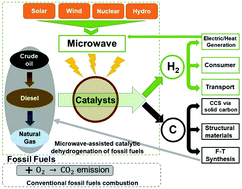The decarbonisation of petroleum and other fossil hydrocarbon fuels for the facile production and safe storage of hydrogen†
Abstract
The importance of extracted and refined fossil carbonaceous fuels (petroleum, diesel etc.) to the development of human society cannot be overestimated. These natural resources have improved billions of lives, worldwide, in providing accessible, relatively inexpensive energy at nearly every scale. Notwithstanding the credible advances in renewable energy production over the past decade or so, the aerial combustion of coal, natural gas and liquid fossil fuels, given humankinds insatiable demand for power, will continue to be the ready source of more than 85% of the world's energy in the foreseeable and possibly the distant future. Human activities based on the combustion of fossil fuels, however, has led to significant anthropogenic emissions of carbon dioxide (CO2) to the atmosphere – and that fact is now seen as the major contributor to global warming and climate change. To stabilise global mean temperatures will depend on the ultimate transformation of humankind's energy system to one that does not introduce CO2 into the atmosphere. The hydrogen economy has long been mooted as a route to achieving the required net-zero emissions energy future. Paradoxically, fossil fuel sources such as petroleum, crude and extra-heavy crude oil, petrol, diesel and methane are reported here to produce high volumes of high-purity hydrogen through their microwave-initiated catalytic dehydrogenation using fine iron particles. The co-product of this dehydrogenation process, solid carbon, can be safely stored underground in perpetuity or converted in future to valuable hydrocarbons and other materials. Through their catalytic dehydrogenation to yield carbon-free hydrogen – rather than through their aerial combustion to produce carbon dioxide – petroleum and other fossil fuels can now serve as an energy pathway to stabilising global mean temperatures.



 Please wait while we load your content...
Please wait while we load your content...